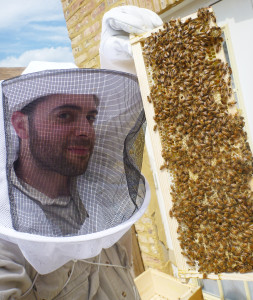By Kyle Gati
Yoga connects me with my inner self, deepens my connection with the earth and enhances my appreciation for nature. Living in a big city like Chicago, one can feel disconnected from nature at times, but beekeeping has helped me find balance between nature and urban life.
This is my third year keeping honeybees on my roof in Noble Square and in a community garden in Ukrainian Village. I reinvest the money I make from selling honey and lip balm into more hives and equipment. Soon I expect to place hives on local farms and in more community gardens in Chicago. I raise my bees free of chemicals, and I manage the hives with a hands-off approach. When in doubt, I let the bees figure it out.
Some people say bees in urban areas actually are better off than those in rural areas. Urban bees experience lower exposure to pesticides and encounter more diverse sources of pollen and nectar, which they convert to honey. Chicago offers quaint, tree-lined streets, gardens, parks, alleys and abandoned city lots with many sources of pollen and nectar, including wildflowers many would consider weeds.
Compare this diversity to that of a monoculture farm that grows a single crop across a vast region. This diversity appears in the taste and texture of the honey.
The truth about local honey
Some claim that local honey helps build tolerance against local allergens. While this remains unproven, there are many other benefits of honey—particularly raw honey. Honey is considered raw when it is unheated and unprocessed. Straight from the hive, it contains natural vitamins, nutrients, enzymes and powerful antioxidants. In my opinion, raw honey tends to be more delicious and uniquely flavored.
Honeybee colonies are disappearing
Over the past few years, beekeepers across the country have lost their hives in historically high numbers. Many attribute this to the phenomenon known as Colony Collapse Disorder (CCD), where whole colonies mysteriously disappear. Bees, beekeepers and the agriculture industry face many challenges that are thought to contribute to CCD:
- Pesticides—thought to cause neurological problems and disorientation
- Parasitic mites, beetles—weakens bees, reducing a colony’s population
- Brood diseases—highly infectious and deadly to bees in larval state
- Climate change—more frequent, extreme temperatures, summer droughts, harsh winters, erratic weather patterns.
What you can do to help
Support local and organic farming practices. Fewer pesticides used to grow food means fewer pesticides ingested by the bees, which means colonies will remain strong and continue to pollinate the food we eat. It’s all one system.
Plant native flowers or trees with different blooming periods. Honeybees always pollinate blooming native flowers first. Decorative flowers may look pretty but provide little pollen and nectar. Plants with different blooming periods ensure that there will always be something for the bees to eat.
Support local beekeepers. Your business is always appreciated, and it keeps us going strong.
It is important to source locally and to stay connected to the origin of our food. When we stay connected to nature, our community and the inner self, we strengthen our connection to the world as a whole. As taught in the philosophy of yoga, we are all one, no matter if you are a plant, animal, insect or human being.
Bee-friendly native flowers
- Partridge Pea (summer to fall)
- Hardy Ageratum (summer to fall Stiff Goldenrod (August to September)
- Coneflower (June to October)
- Wild Bergamont (July to September)
- Horsetail Milkweed (early to late summer)
- Butterfly-weed (June to August)
- Prairie Milkweed (June to July)
- Joe Pye Weed (July to September White Snakeroot (September to frost)
- Find out more at: http://beespotter.mste.illinois. edu/topics/beegarden/
Sweet Beginnings, LLC makes the family of beeloveTM products, an all-natural line of raw honey and honey-infused body care products. It provides important full-time transitional job opportunities to formerly incarcerated individuals who are trained to care for the bees, harvest honey, make, package and ship products, as well as other work experiences that transfer to market positions in many industries.
Find their products online at www.sweetbeginningsllc.com or at Chicagoland Mariano’s and Whole Foods Market stores.
For more information on my beekeeping adventures, visit my blog: www.thehivelife.com.
To find out when honey and honey-based products are available, follow and like my page on Facebook: www.facebook.com/noblehoneychi


























No Responses to “The Hive Life: Chicago Rooftop Beekeeping”